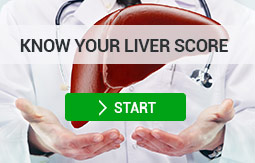What’s in this article
- What causes liver cancer?
- Prevention & risk factors
- Who is at risk?
What causes liver cancer?
Liver Cancer tends to occur when the liver is damaged by birth defects, alcohol abuse, chronic infection with diseases such as hepatitis B and C and cirrhosis.
Diseases such as fatty liver disease, which affects 80 million Americans, can also lead to liver cancer if left untreated and poor lifestyle choices are continued. If you are suffering from any type of liver disease it is important to see your doctor regularly to monitor the progression of the disease.
Not every cancer that affects the liver is liver cancer, when the cancer originates in another area of the body such as the stomach and spreads to the liver is called metastatic cancer. The cancer will also be named after the organ where it originated, for example, metastatic stomach cancer, even though it now also is present in the liver. According to the Mayo Clinic, cancer that spreads to the liver is more common than cancer that begins in the liver cells.
Prevention & risk factors
To help prevent liver cancer there are certain lifestyle changes that you can make. Eating a healthy diet is important as everything you eat and drink is processed through the liver and bad foods will put a strain on your liver and make it work over time. If you are unsure about what foods are good and bad you can have a look at What to Eat and What to Avoid. It is advised to cut out alcohol and smoking, both of which put a strain on your liver and the rest of your body.
Exercise is also a very important element in liver health. Regular exercise helps to keep your weight down and your liver healthy, you should aim for at least 150 minutes of moderate aerobic activity or 75 minutes of vigorous aerobic activity a week according to the Department of Health and Human Services.
It is important to avoid contracting any of the hepatitis viruses, according to the Sloan Kettering Memorial Cancer Centre up to 80 percent of primary liver cancers around the world are caused by infection with the hepatitis B or hepatitis C virus. As hepatitis can be fatal so it is important to take the right precautions. If you are at risk of contracting hepatitis then it is important to get screened for the disease, there is even a vaccine against hepatitis B available.
Who is at risk?
According to the Mayo Clinic, certain factors increase the risk of liver cancer, these include:
- Chronic infection with hepatitis –Chronic infection with the hepatitis B or C virus increases your risk of liver cancer.
- Cirrhosis of the liver –This is an advanced and irreversible liver disease that causes scar tissue to form in your liver and increases your chances of developing liver cancer.
- Inherited liver diseases –Liver diseases that can increase the risk of liver cancer include hemochromatosis and Wilson’s disease.
- Diabetes –People with diabetes have a larger risk of liver cancer.
- Nonalcoholic fatty liver disease –A disease which creates a buildup of fat in the liver therefore increasing the risk of liver cancer.
- Exposure to aflatoxins –Aflatoxins are poisons produced by molds that grow on crops which are not stored correctly. Crops such as corn and peanuts can become contaminated with aflatoxins, which can end up in foods made of these products. In the United States, safety regulations limit aflatoxin contamination.
- Excessive alcohol consumption –Consuming more than the recommended amount of alcohol daily over many years can lead to irreversible liver damage and increase your risk of liver cancer. One drink per day is advised for women and two for men.
Learn about how to keep your liver healthy with Lauren Wagner RD and Amsety by watching this short video
References
Liverdirectory.com
Mayoclinic.org

 (442) 244-5115
(442) 244-5115













